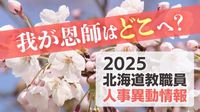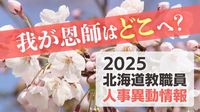On March 23, 2025, the Hokkaido Board of Education unveiled significant personnel changes in the province's public schools, impacting a total of 1,393 individuals across various educational institutions. This announcement coincides with the forthcoming retirement of many educators, which will officially take effect on March 31.
The changes include adjustments for principals, teachers, and staff at public high schools, secondary education institutions, and special support schools, as well as those within Sapporo City high schools. This move is part of the Board's continuing efforts to enhance the educational environment and address ongoing issues within the school system.
As part of these personnel changes, an incident involving a 61-year-old elementary school teacher came to light. The teacher was reprimanded after he resorted to physical discipline by striking two boys who were reportedly running around the classroom during lessons. According to the Hokkaido Board of Education, the teacher’s actions were intended to stop what he perceived as dangerous behavior but highlighted a significant lapse in emotional control.
“I wanted to stop what I thought was a dangerous act, but I lost control of my emotions,” the teacher explained following the incident. This event raises important questions about disciplinary methods in schools and the implications of physical reprimand.
In a separate and more severe case, a 65-year-old high school teacher was dismissed for sending threatening letters to four members of the Japanese Diet, including lawmaker Minae Sugita. The teacher's actions drew severe criticism and resulted in his immediate dismissal, which has raised alarms about the behavior of educators and their interactions with political figures.
This teacher was reportedly motivated by political disagreements, which further demonstrates the broader conversation regarding political activism within the teaching profession. “The letters were sent in response to political opinions that I found unacceptable,” he stated, illustrating his rationale behind the threats.
The unfolding issues surrounding teacher conduct in Hokkaido reflect wider national concerns about the standards and professional conduct expected of educators. The response from the Hokkaido Board of Education and local communities has varied; some have called for stricter regulations and oversight to prevent similar incidents from happening in the future.
Moreover, as public attention remains fixated on these troubling incidents, the broader implications of the personnel changes are being scrutinized. The educational reforms, such as the proposal for a ‘Self-Recommendation Principal’ model, have put additional focus on how educators are evaluated and selected within the system.
In light of the recent disciplinary actions and dismissals, some stakeholders, including parents and local education advocates, are urging the Board of Education to implement better training and support systems for teachers. “It’s crucial that we equip our educators with the tools necessary to manage their classrooms effectively and maintain professional standards,” said a parent from Sapporo.
As these personnel changes are set to take place on April 1, 2025, all eyes remain on the Hokkaido Board of Education. The effectiveness of these changes and the underlying issues that prompted them will likely continue to be topics of discussion in the weeks and months to come.
The situation serves as a stark reminder of the responsibilities educators carry—not only in imparting knowledge but also in exemplifying appropriate behavior for their students. As this narrative unfolds, it will be critical to examine how these incidents could illuminate necessary reforms within the education system.
The community's reaction to these events also emphasizes the need for a cultural shift regarding the perception of teacher conduct in Japan. The local populace is voicing the need for instructors who not only educate but also instill values of respect, understanding, and emotional intelligence among their students.






